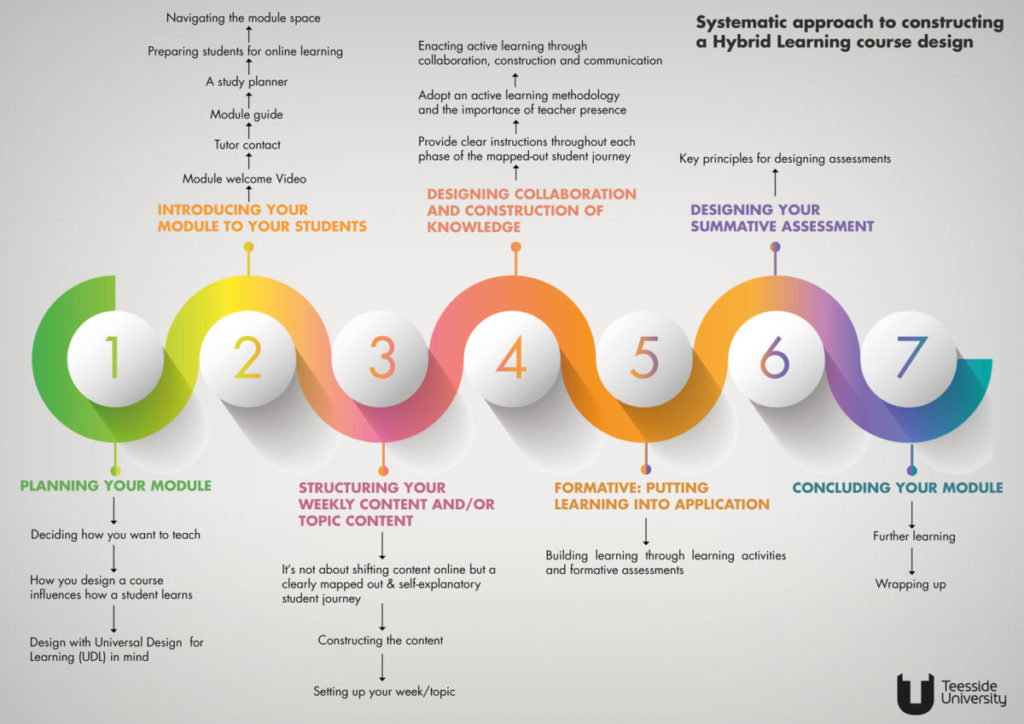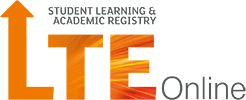The Principles of Course Design for Hybrid Learning Toolkit is a resource to support the Resilience Review Tool process for schools.
The aim is to contextualise the Hybrid Learning model to the nature of the subject discipline and assist in determining the extent to which courses could be delivered within the Hybrid Model.
The toolkit is a downloadable document available on the LTE Unity pages (you will need to log in using your university credentials to access this). You can access the document via this page: https://blogs.tees.ac.uk/lteonline/learning-and-teaching/principles-of-course-design-for-hybrid-learning/
How to use the toolkit
As we move to business recovery planning and seek to ensure that our portfolio and those who deliver it are resilient to disruption and change, the online environment and the opportunities provided by digital tools have a significant role to play.
The toolkit is a collection of good practice and are suggestions and recommendations for course and module teams to consider in their planning of a course/module for a high-quality online student academic experience to meet student expectations and student engagement in learning. The focus of this work is on how to design courses and modules for Hybrid Learning, particularly focusing on the design of the online components.
Within each element of learning design is a series of key considerations and principles of course design to help you and your course teams plan for multiple modes of learning and teaching. Course Teams and Module Leaders are encouraged to use the space provided to note their responses, thoughts or comments on how they see their course and modules becoming resilient towards the transition to the Hybrid model of learning.
The toolkit offers:
- A methodology for seamless and coherent integration of digital solutions as part of a campus-delivered course design. It offers help in identifying things to consider when making decisions about what activities are best served online or on campus, and how you make that decision.
- The suggestions and key questions within each section of the seven part journey can be utilised as a resource to use as a key part of the course design process. They are structured around student centeredness, whilst at the same time considering individual development needs and those of the wider course team. This aids in developing an academic offer that is of rigorous and high quality.
- To provide a deep, analytical and robust design tool for the design of Hybrid Learning courses from a student journey perspective.

Each element of planning mapped onto the systematic approach will be discussed in blog posts on Monday – Wednesday over the coming weeks.
LTE Support
Working through this resource will raise questions and will have helped identify additional staff development needs to design meaningful and innovative curriculum.
Taking time to be properly trained in how to use digital tools and solutions for your learning design will help with understanding how the tools operate, how they can support you in your course design journey and their pedagogical strengths and weaknesses.
We encourage you to master the digital solutions supported by the university. Our help guides and resources are available from the LTE Online Digital Delivery of Learning hub: https://blogs.tees.ac.uk/lteonline/digital-delivery-learning-and-support/.
Numerous Blackboard-based help guides can also be found on the ‘Help’ tab in Blackboard. The applications within the University’s Future Facing Learning Toolkit (pre-loaded onto staff and student iPads) are intentionally device agnostic. There is more information on this here: https://extra.tees.ac.uk/HelpCentre/Pages/FFLtoolkit.aspx#b5
Colleagues are encouraged to regularly visit LTE Online, which continues to expand with resources and self-help guides. New blog posts are published at noon each day. Blog posts will be tailored to this resource so that key considerations can be addressed with further signposting and support.
You can also contact elearning@tees.ac.uk for further support. We offer 1-1 coaching sessions with Principal Lecturers, Digital Learning Developers or Online Learning Designers via Microsoft Teams.
